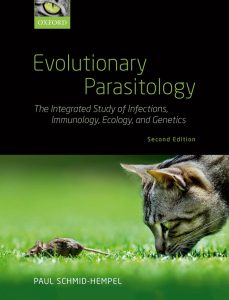
Evolutionary Parasitology: The Integrated Study of Infections, Immunology, Ecology, and Genetics, 2nd Edition
by Paul Schmid-Hempel
September 2021

Parasites are ubiquitous and shape almost every aspect of their hosts, including physiology, behaviour, life histories, the structure of the microbiota, and entire communities. Hence, parasitism is one of the most potent forces in nature and, without parasites, the world would look very different. The book gives an overview over the parasite groups and the diversity of defences that hosts have evolved, such as immune systems. Principles of evolutionary biology and ecology analyse major elements of host–parasite interactions, including virulence, infection processes, tolerance, resistance, specificity, memory, polymorphisms, within-host dynamics, diseases spaces, and many other aspects. Genetics is always one of the key elements in these topics. Modelling, furthermore, can predict best strategies for host and parasites. Similarly, the spread of an infectious disease in epidemiology combines with molecular data and genomics. Furthermore, parasites have evolved ways to overcome defences and to manipulate their hosts. Hosts and parasites, therefore, continuously co-evolve, with changes sometimes occurring very rapidly, and sometimes requiring geological times. Many infectious diseases of humans have emerged from a zoonotic origin, in processes governed by the basic principles discussed in the different sections. Hence, this book integrates different fields to study the diversity of host–parasite processes and phenomena. It summarizes the essential topics for the study of evolutionary parasitology and will be useful for a broad audience.
